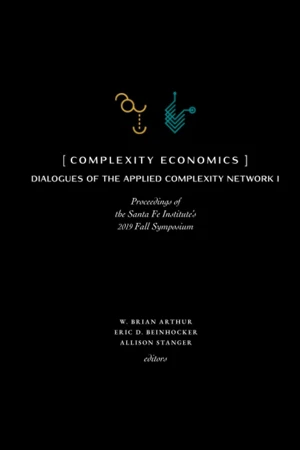Complexity Economics – Proceedings of the Santa Fe Institute's 2019 Fall Symposium

Blurb
When Santa Fe Institute scientists first started working on economics more than thirty years ago, many of their insights, approaches, and tools were considered beyond heterodox. These once-disparaged approaches included network economics, agents of limited rationality, and institutional evolution—all topics that are now increasingly considered mainstream. SFI continues to expand the boundary of our economic understanding by pioneering fields as diverse as collective intelligence and organizational scaling. This volume, edited by W. Brian Arthur, Eric D. Beinhocker, and Allison Stanger, includes panel and talk transcripts from SFI’s 2019 Applied Complexity Network Symposium, with newly written introductions and reflections. Representing both scholarly and practitioner perspectives, this book explores the history and frontiers of complexity economics in a broad-ranging, accessible manner.Book summary
What can we learn from conceptualizing economies and social systems as complex and adaptive? The Santa Fe approach shows that this feature of real-world economic systems often implies significant non-linearities, heterogeneity and emergent phenomena that are not well-captured by standard models of equilibrium. Instead, SFI scholars have typically adopted a disequilibrium perspective that focuses on the interaction of social agents on multiple dimensions rather than the simplistic view of atomistic decision-makers who only interact by the price mechanism that orthodox economics has typically taken. The SFI tradition traces back to a long history of several decades of research, with its themes and methodologies like networks or institutional depdence becoming increasingly relevant also in more mainstream approaches. This volume explores several of those topics in an accessible manner and presented by leading experts in their field.
Comment from our editors:
When network theory, disequilibria and phenomena of path dependence among others become increasingly relevant in mainstream economic circles, this is in part due to the constant groundbreaking effort and work of SFI and SFI-adjacent scholars. Complexity economics is, of course, interesting in its own right but can also serve as an interesting case study how pluralist approaches might find resonance within rather orthodox circles. This volume is definitely a great start to get to know these central tenets of complexity economics in recent decades, if only to get started and dig deeper into technically more advanced expositions.

